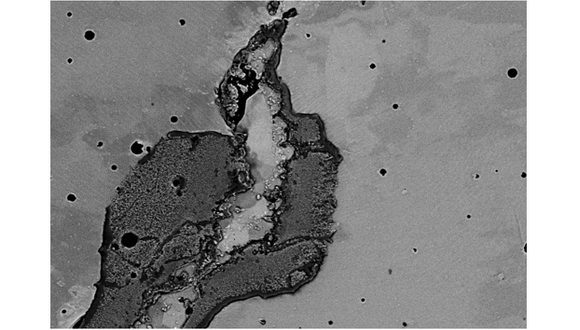Tue, 22 June, 2021
TWI has embarked on a new joint industry project (JIP) related to stress relaxation cracking (SRC) failures. SRC can cause catastrophic failures in assets, such as refineries and power plants, and we are working to develop methods to assess and predict cracking, as part of fitness-for-service programmes.
We spoke to TWI project leader, Imran Bhamji, to find out more about the project…

Imran, can you start by introducing yourself and letting us know what you do at TWI?
I am a project leader in the Materials Performance and Characterisation Section of TWI, having joined the organisation in 2017. I assist TWI's Industrial Members with failure investigations, materials characterisation, materials testing and performance assessments involving stainless steels and non-ferrous alloys. I graduated from the University of Manchester in 2007 with a Master’s degree in Materials Science and Engineering and then completed an EngD, also at the University of Manchester, sponsored by TWI Ltd, in 2012. Prior to joining TWI, I had a number of academic roles, at the Open University and the University of Manchester, investigating cracking in power plant steels and preventing corrosion of nuclear fuel rods.
When it comes to SRC, why is it such a problem and what industries does it relate to?
SRC affects high temperature components in a number of industries including refineries, nuclear power plants and concentrated solar power. Failure can have financial implications related to downtime and repair costs, and it can also occur, unexpectedly, meaning there is a risk to personal health. TWI has knowledge of tens of SRC failures, derived from work with its clients over the last 40 years, which is likely to be just the tip of the iceberg. It is therefore important that near-term solutions are found to this problem, as components are likely to be operating, unsafely, with a significant risk of failure.
What causes SRC and how is the JIP seeking to solve the problem?
SRC occurs over moderate service durations at high temperature, typically between 500-750°C, in stainless steels and nickel alloys. The cracking is predominantly in the weld metal or heat-affected zones of welds, and is intergranular, with heavily-oxidised crack surfaces. Cracking occurs without any gross plasticity and with all deformation concentrated at grain boundaries.
SRC is often thought to be associated with the relaxation of welding residual stresses in heavily restrained components, particularly for thick section welds. The mechanism is thought to involve the relaxation of residual stresses, during high temperature service, where strain can only be accommodated by the material surrounding the weld, because of the heavy restraint. At the same time as stress relaxation, precipitation has also been suggested to be significant by strengthening material in the grain interiors, relative to the grain boundaries, resulting in deformation being concentrated at the grain boundaries and causing cracking to occur without gross deformation of the component.
However, it is apparent that oxidation also plays an important role in failure. It is thought that the presence of metallic tongues in cracks, which is a key diagnostic feature of SRC, can only be explained by oxidation playing a crucial role in cracking. The first phase of a JIP was therefore instigated to generate more data to better understand the failure mechanism.
Who are TWI working with on the project and what are the hoped-for benefits of this work?
We are currently working with Arcelor Mittal, Chevron and EDF on this project. The first phase is to understand the failure mechanism, as effective avoidance strategies cannot be adequately formulated without this good understanding. A second phase is also envisaged, which will attempt to identify strategies to avoid failure and/or to define safe operating regimes, for which failure is unlikely to occur. This will give confidence to operators that their plants are safe.
Is there anything more you would like to add?
We are mid-way through our JIP project and have so far been able to replicate SRC characteristics, including metallic tongues, in small-scale laboratory test specimens. We hope to start the second phase of the project in 2022. We think there is great value in exchanging knowledge related to this complicated failure mode. Therefore, please get in touch, if you would like to discuss involvement in the JIP, or SRC more generally, further.
